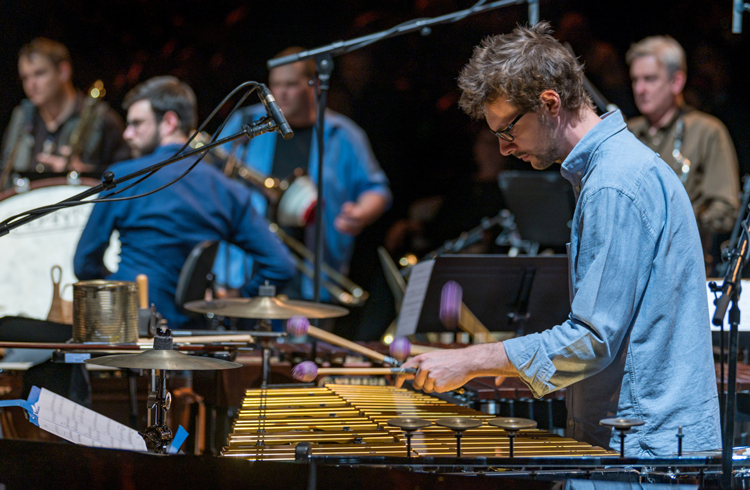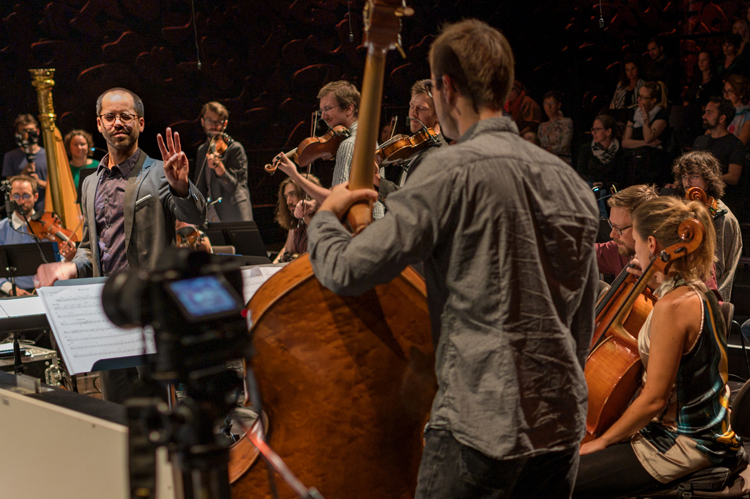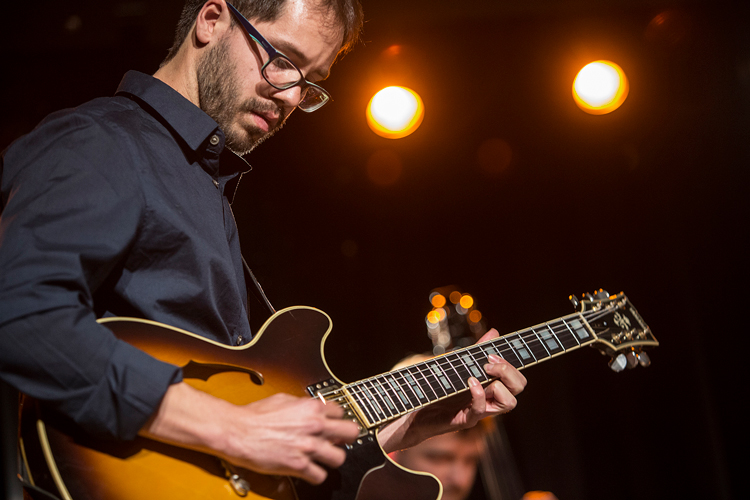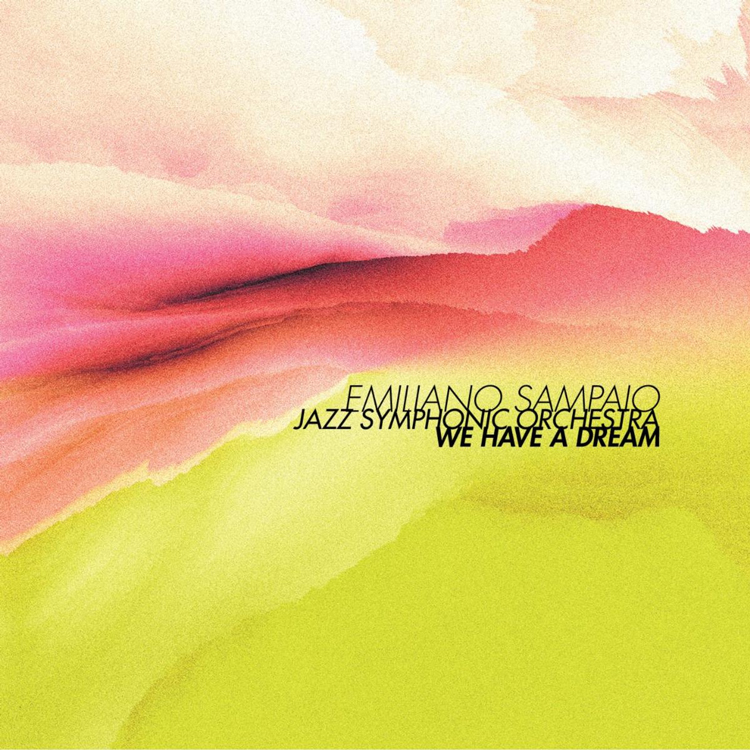Brazilian multi-instrumentalist and composer Emiliano Sampaio has a new album titled “We Have a Dream“. Notably, Sampaio brings together jazz and classical music in the form of a Jazz Symphonic Orchestra.
Sampaio says about the album: “Since my teenager years, I was fascinated by big bands and orchestras. Now, thirty-seven years old, and after releasing fifteen albums as bandleader, I finally live this dream of writing music for my own Jazz Symphonic Orchestra!
“Although the classical orchestra and jazz traditions are both strongly present in the music, I aimed to create a large work that dissolves the “invisible wall” between classical and jazz musicians, bringing them together and finding new ways for cooperation and interaction. The whole process created a new relationship and hierarchy between composer, conductor, musicians and written music, showing that an orchestra playing should be an inspiring example of people working together!”
This project fulfills Sampaio’s longtime dream: “I couldn’t be more excited to release this album, which is the realization of a dream that I’ve had since I was in my teenage years…writing orchestral music. This music is a result of the four years of doctoral artistic research I did at the University of Music and Performing Arts in Graz. I investigated how one can establish communication between jazz and classical musicians by encouraging them to collaborate more in the large ensemble context.

“That investigation led my artistic work to examine, explore, and question the hierarchy that is still very present and has historically been reproduced in large jazz ensembles.
“As Christopher Small points out in his book Musicking, the relationships and traditions in making music are a “matter of choices and there is nothing inevitable about the arrangements we make, it is not ordained by nature but is a social arrangement” (1998:36).
“Though all pieces were initially composed and arranged by me, during the rehearsal process the musicians had almost infinite freedom to change, erase, recompose, adapt, and improvise the music to fit their own musicality. In this process, they experienced the feeling of playing in a small jazz band albeit with almost forty musicians… a concept that has been tried in the past by many musicians coming from classical, jazz, and other musical genres to different results.

“Our orchestra experience seemed to create new hierarchies between the musicians, composer, conductor, and the written music, in general. It strengthened the cooperation between everyone and opened up new ways for us to think about how to make large ensemble music where the barriers between composer, conductor, interpreter, and improviser can be liquid.”
The album also has a profound social justice commitment: “On a deeper and more universal level, I would like to dedicate this work to the fight against racism and poverty around the world. In May 2020, the murders of George Floyd, Breonna Taylor, and other black Americans in the US sparked a series of protests against racism around the world and influenced my work directly because I was composing this music around the same time.
“As a Brazilian, I see racism and poverty close up as a structural and social problems. However, coming from a white, middle-class family, I always held a privileged position. Now, 37 years old, I would like to use my own life experiences and human responsibility to draw attention to this highly important and perennial topic. Now is the time to make clear to society that basic human needs are universal and must be met. Only through this clarification and social change can we speak of a world in which justice and equality prevail.
“During my musical research for this project, I realized that I knew almost nothing about black orchestra composers and started to discover beautiful music written by composers such as Samuel Coleridge-Taylor, Florence Price, William Grant Still, Undine Smith Moore, Julius Eastman, and George Walker. These and many other black composers have long been denied a proper place in music history, and I hope to help change this by highly recommending that you check out their music!
“Along with my emotional motivation to write this music, my artistic research also resulted in a dissertation. It aims to help better understand the social arrangements established in Large Jazz Ensembles, to place the Jazz Symphonic Orchestra tradition in historical context, and to link it to the development of the Third Stream. I invite the listener (musician or not) to read my dissertation in order to better comprehend how this album was conceived and to learn more about the long journey that encompasses the initial concept through to the final composition of this music.
“The album was a four-year effort: “I am happily releasing this album after four years of challenges and discoveries about music, the world, and myself. Musicking in a large ensemble context deals intimately with hierarchy and is a powerful tool to help question the ways in which we relate to each other, whether in the musical world or in our daily lives. It brings the possibility for new aesthetic experiences, and more importantly, it can improve the artists’ individual and/or group experiences by changing the relationships with each other. Furthermore, for the world as a whole, this kind of experience can provide a way of existing that is based on trust, collaboration, and serenity. An orchestra playing should be an inspiring example of people working together!“
About Emiliano Sampaio

Emiliano Sampaio is a talented guitarist, trombonist, conductor, arranger and composer. He was born in São Paulo (Brazil) in 1984. He studied music initially at the University of Campinas. In 2012, Emiliano moved to Graz in Austria, where he studied jazz composition. In 2021, he finished his doctoral artistic research “Restructuring Hierarchy Within and Between Jazz and Classical Orchestras” with honors.
As a bandleader, Emiliano released eleven albums with his trio, his nonet and his own big band and his music was played in important Brazilian, Australian and European jazz clubs and festivals.
As a conductor, arranger and composer, he has worked with the Metropole Orkest (Netherlands), HR Frankfurt Radio Big Band, CCJO (Cologne), JazzKombinat (Hamburg), Lungau Big Band (Salzburg), Fete Huppe (Hanover), Uptown Big Band (Bern), Wayjo (Perth), Toshi Clinch Big Band (Melbourne), Big Band & the Vocals (Copenhagen), HRT Croatian Radio Band, Uni Jazz Orchestra (Regensburg), Graz Composers Orchestra (Graz), Mere Bigband, Soundscape, Speaking Jazz Big Band (Sao Paulo), Jerimum Big Band (Natal), Badi Assad, Dominguinhos, Trombone Quartet of Campinas, Orquestra Experimental de Sao Carlos (Brazil) and others.
Emiliano won many prizes for his work such as 1st Prize at the Karel Krautgartner composition contest (Prague), diverse “Downbeat Student Awards” in the categories “Best Small Jazz Combo”, “Jazz Soloist”, “Outstanding Original Composition”, “Outstanding Arrangement for Large Jazz Ensemble”, and 3rd Prize in the Jazz Comp Graz Composition Contest.

